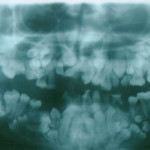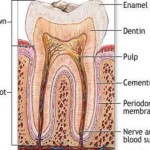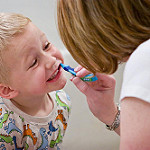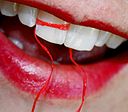Parents, in particular, want to know: does DNA predetermine dental health? It’s the classic nature vs. nurture question that get asked often, but the answer doesn’t simply boil down to one or the other. The scary truth is that many dental problems are indeed “inherited”- but not from genetics alone! Harmful habits that run in the family can also play a huge role in the health of your child’s smile. Find out which oral issues you could be passing down, and what you can do about them.
DNA- Driven Dental Issues
Even before birth, the stage has been set for certain aspects of your child’s oral health. Ultimately, your child’s genes dictate the likelihood for common issues such as:
Jaw – related Disorders

The size and position of one’s jaws, as well as the overall facial structure, are hereditary traits that can cause a number of bite complications (or “malocclusions“). Overbites or underbites caused by uneven jaws can lead to chewing and speech difficulties, and result in chronic pain and/or Temporomandibular Jaw Disorder (“TMD”) if left untreated. (Photo: Wikipedia)
Tooth Misalignments

Spacing problems, either due to missing or overcrowded teeth, are oral issues that have been hardwired in a person even before the emergence of teeth. Cases where people lack some (“Anodontia“) or all (“Hypodontia“) permanent teeth can threaten gum and jaw health, as can instances of “supernumerary” teeth, in which extra teeth erupt. (Photo: Wikimedia Commons)
Weak Tooth Enamel
 Though rare, it is possible for tooth enamel to be defective, or develop abnormally. Dentin, which makes up the protective enamel covering of teeth, may not be produced or mineralize at normal levels, leaving teeth vulnerable to decay, sensitivity and damage.
Though rare, it is possible for tooth enamel to be defective, or develop abnormally. Dentin, which makes up the protective enamel covering of teeth, may not be produced or mineralize at normal levels, leaving teeth vulnerable to decay, sensitivity and damage.
From serious conditions such as a cleft palate, to occasional aggravations like canker sores, many other oral issues may be linked to genetics. Keeping track and sharing the family’s health history with your child’s dentist can help detect and treat inherited conditions as early as possible.
Behavioral Risks
DNA May deal your child some unavoidable complications, but when it comes to tooth decay and gum disease, learned habits and tendencies shoulder much more of the blame, including:
“Oversharing”
Harmful oral bacteria from a loved one can easily colonize and overtake your little one’s mouth from something as simple as sharing food, utensils, or kissing. The inadvertent swapping of saliva can put your child at increased risk for cavities and gingivitis. (Photo by donnieray / CC BY)

Diet Choices
 Satisfying that sweet tooth with sugary, refined treats, or turning to soda and juice for refreshment can create an unhealthy addiction that’s as dangerous to the mouth as it is to the waist.
Satisfying that sweet tooth with sugary, refined treats, or turning to soda and juice for refreshment can create an unhealthy addiction that’s as dangerous to the mouth as it is to the waist.
Sugar and acid can eat away at the tooth enamel, causing cavities and tooth sensitivity. Exposure to certain chemicals and ingredients can also cause discoloration. (Photo by MM / CC BY)
Bad Hygiene
Last, but certainly not least, lacking a good dental routine can wreak havoc on teeth and gums. Failing to follow through on brushing and flossing twice a day (or as recommended by the dentist) can create a haven for cavities and periodontitis, not to mention halitosis (bad breath).
Leading by example is an easy, effective way to teach your child the importance of oral health while benefitting the whole family. (Photo by D. Sharon Pruitt / CC BY)
Stay One Step Ahead
 Ever parent wants the best for his or her child – including a healthy smile. With so many potential problems that can be passed down, protecting your child’s oral health is not easy, but you don’t have to do it alone. Seek the help of your child’s dentist for optimal professional and at-home dental care. Treating existing issues early on and teaching your child to make dental-friendly decisions can provide lifelong benefits to his or her teeth. (Photo by Brian / CC BY)
Ever parent wants the best for his or her child – including a healthy smile. With so many potential problems that can be passed down, protecting your child’s oral health is not easy, but you don’t have to do it alone. Seek the help of your child’s dentist for optimal professional and at-home dental care. Treating existing issues early on and teaching your child to make dental-friendly decisions can provide lifelong benefits to his or her teeth. (Photo by Brian / CC BY)




